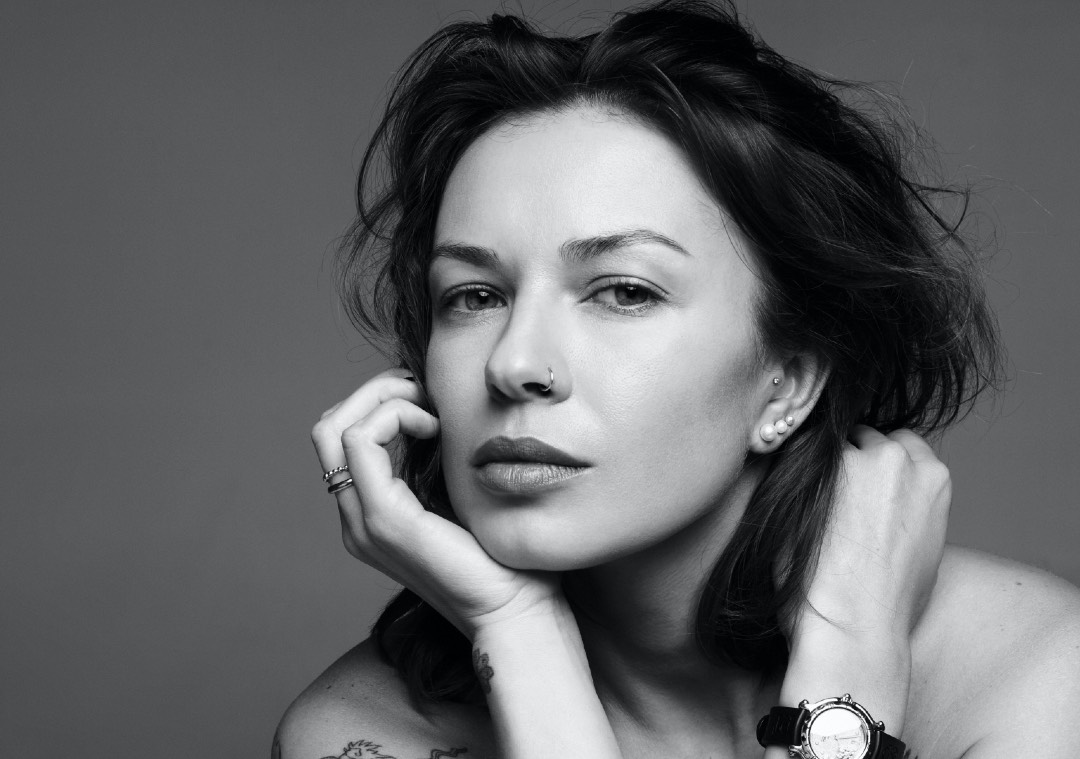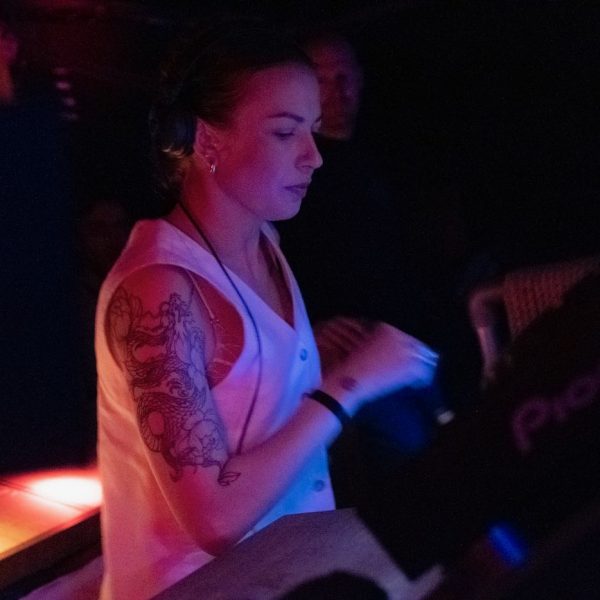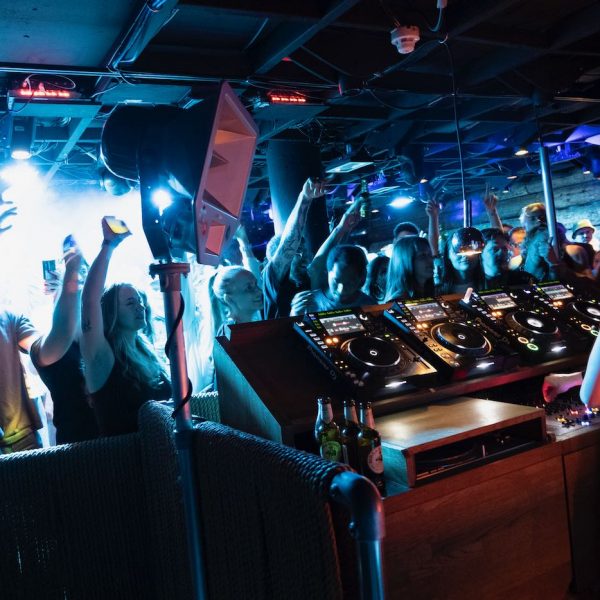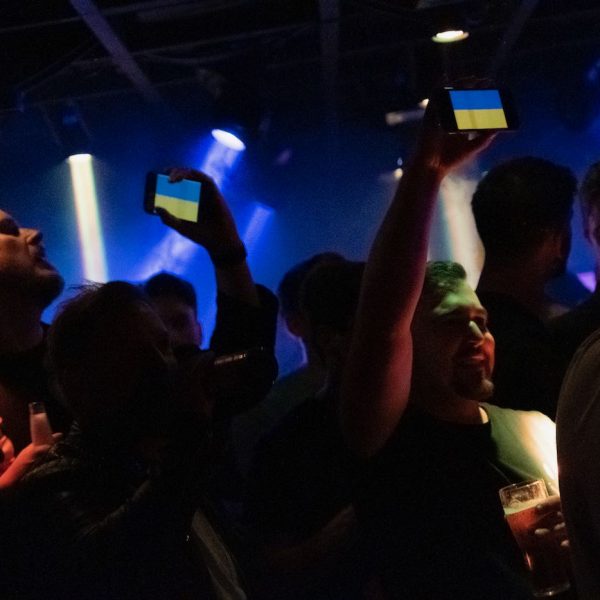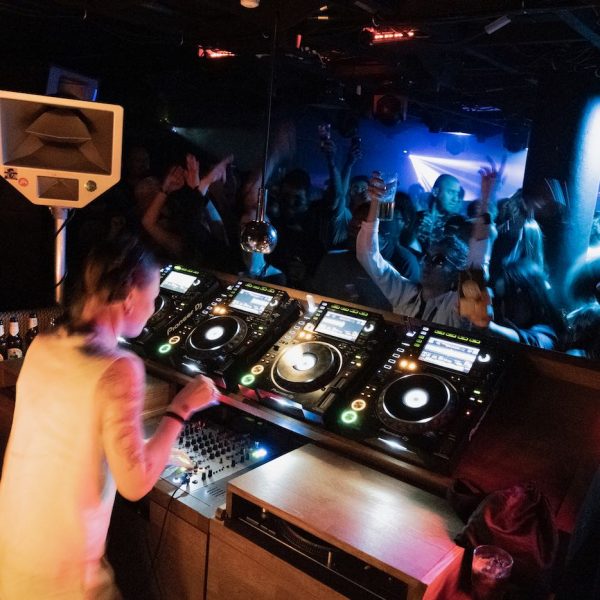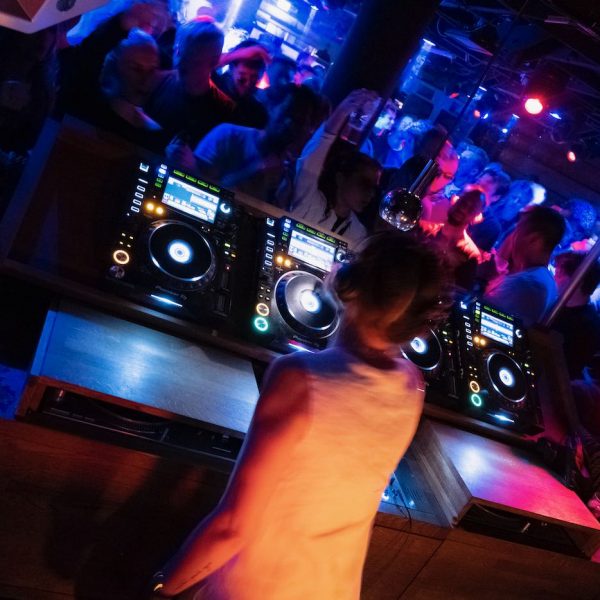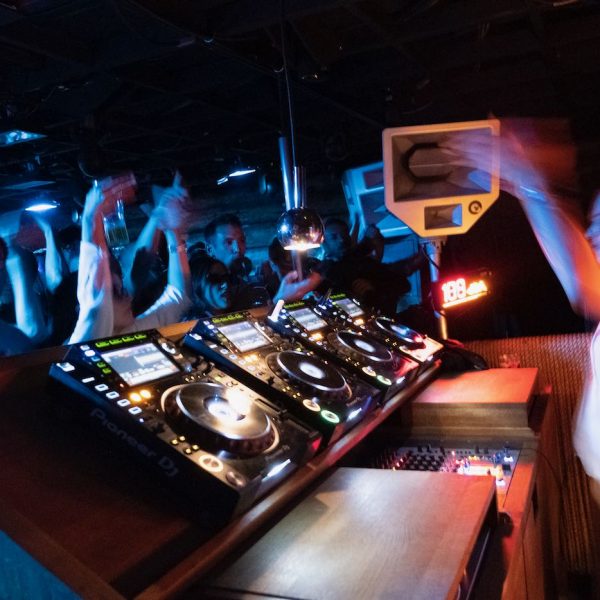“What a way to end a set!” echoes through the crowd as the last remnants of an amen-breakbeat fade out. Nastia takes a reverent bow while the people in Jaeger’s basement press up against the booth, some of them still holding up phones, illuminated with the colours of the Ukrainian flag. Nothing she played alluded to any Ukrainian nationality, but there was an obvious and visible acknowledgement and you would have to have been living under a rock this past year, to avoid news of the ingoing war in Ukraine. I hear messages of support in English and what I assume is Nastia’s native-tongue, and while people file out of the basement as I’m reminded yet again of Bill Brewster and Frank Broughton’s iconic quote form Last Night a DJ saved my life; “Dancing is political, stupid!”
It’s a quote I was eager to bring up when I sat down with Nastia earlier that day in the hotel lobby. Did it resonate with the Ukrainian DJ under the circumstances? “To be honest I don’t have an answer to this question,” she considers for a moment, “because the opinion is so big and there are so many sides to it.“ Even so, she can’t seem to draw a definitive line in the sand for politics, because in her opinion “we’re all dependent on it!” It’s “pure ignorance,” she pressed to propagate a “message that music is out of politics.”
Nastia’s fortitude and resilience in the face of the terrible atrocities facing her homeland has been an inspiration to witness. She has been a vocal critic since the war erupted with Russian troops invading Ukraine and continues to show a determined front under what I can only assume to be difficult personal circumstances.
“It’s a hard situation for everybody,” she remarks ”not just for me and I still believe I’m one of the lucky ones.” Even though Nastia and her daughter are technically refugees, they’re not dependent on their refugee status and have declined the help of foreign governments. While other women in the same situation rely on international aid, Nastia and her daughter want for nothing. “I’m super lucky to be an international artist,” she admits with her language skills and experiences as a well-travelled artist giving her an advantage over most.
She currently resides in Amsterdam. The “cute and cosy” Dutch capital was the “only city” she considered when she had to relocate. Its accessibility to an international DJ circuit and its central location within Europe had a big influence on her decision, but I doubt it has given her any respite from being away from her home in Kyiv and the family and friends she left behind.
At the time of writing her daughter will be enrolled in a boarding school in the UK, and with her daughter’s father returning to the front-line after recovering from injuries sustained on his last tour, Nastia’s family is currently spread across Europe while she continues to work, travelling around the globe. I can’t imagine this is easy for the DJ. “Why?” she replies. “I have to be an example,” she says flatly. “I truly believe I have a purpose. I have a responsibility.” It’s the nature of “being a Ukrainian woman; We don’t wait for help.“
It’s that very same resolution that propelled Nastia forward on the 24th of February 2022, when she woke up to the news of the Russian invasion. She packed her car with her daughter and drove to the Polish border. “We were supposed to fly to Turin,” she remembers, but “the war arrived earlier” than expected, closing the airport on the day of their proposed flight. Nastia had two options; take the train or drive. She chose to drive, thinking it would be safer and “more independent,” but having never driven across a border she admits she “was not prepared.” She “left, with a half empty bag, because I couldn’t understand what I needed at the moment,” and stressed continuously about whether she had the correct documents to get across. After twenty four hours of driving, most of which was stuck in long queues at the border and between borders, she and her daughter finally made it safely across the border. It was a harrowing ordeal even with the “incredible” job by the Polish border.
Unlike the Polish border and much like Nastia, most of Ukraine was blindsided by the news of the Russian invasion. “Nobody knew,” the war was coming , because in Ukraine they had kept news of Russia’s advancing forces scant. “They were keeping it till the end, because they didn’t want people to panic,“ explains Nastia. She and most of Kyiv were having “a normal day,” and “personally” she, like most of us watching events unfold remotely, “didn’t believe it” would ever happen. We were all, except perhaps for the American politicians, taken by surprise.
We were all under the impression that a relative peace had reigned in the region after a tumultuous decade. We saw the uprising of the Maidan revolution as the start of a political revolution for the country, one that would be sadly bookended by the eventual annexation of Crimea by Russian forces by 2014. It seemed a compromise was reached, but unbeknownst to most, tensions continued to simmer.
From Russia’s point of view the situation was exasperated at the arrival of pro-European/pro-west leader, Volodymyr Zelenskiy. The ex-actor/comedian was elected in 2019, with huge public support rallying behind his efforts after the 2014 revolution. It seemed that the people finally had their man, but with Russia’s Vladimir Putin proclaiming a “nazi” force was at work in the Ukrainian capital, it didn’t go down so well in the east of the region.
“Before the revolution in 2014,” explains Nastia, “he (Putin) was sure (Ukraine) was going to be a Russian country like Belarus,” kowtowing to Russian trade agreements and political demands. When Ukraine’s people lead by Zelenskiy, “took the direction towards a European union” and refused “to join Russia in a trade agreement” this was the straw the camel’s back for Putin, who insisted now that he wanted to “denazify” Ukraine in what he deemed a “special military operation.”
That, now familiar rhetoric, “is just one man and a toxic propaganda,” according to Nastia. It’s no secret she has been a staunch supporter of Zelenskiy and his efforts. She voted for Zelenskiy and is in favour of a European Union. She believes in a free Ukraine, not some soviet hinterland smothered in the tight grip of Putin’s fist. “If this had been Poroshenko,” Ukraine’s previous president, she continues, “he would’ve given away Ukraine.” Even while Poroshenko formed the first government after the 2014 revolution, Nastia is certain it took Zelenskiy’s resolution to free Ukraine from Russia’s nostalgic fever dream of a reunited USSR. “There is no other politician in Ukraine that would’ve defended Ukraine like Zelenskiy,” she insists.
Images of the resilient president, dressed in fatigues like a live-action G.I Joe, cut a determined image at the outbreak of the war and continues to do so in the media today. The young president refused to flee his country even at the insistence of his foreign counterparts, a stark contrast to Putin, hiding away in his “humble” abode. As fighting intensified, driving Russian troops eastward, his fortitude inspired a nation and a whole European continent for Nastia. “European leaders believed that Ukraine could win, and they started to help,” she believes. “Most of the people didn’t accept Zelenskiy as a serious president and it was only when the war started,” that the public opinion shifted.
Unfortunately, this public opinion didn’t seem to reach the Russian people. In what she believes is one the “most shocking” developments in this war, Nastia says it has “completely” broken down the relationship between Ukrainian- and the Russian citizens. “We felt that we were on the same page,“ but after the war broke out “we clearly saw it was not like that.” Part propaganda, part ignorance and part misremembered history, have skewed the Russian narrative on the situation. Nastia thinks there’s “no way back” in mending these broken fences with her neighbours and in some sense her fellow countrymen.
Born in Fabrychne, a small village rubbing shoulders with the Russian border in the Luhansk region, Nastia was born into a Russian speaking family. For all intents and purposes she might have been Russian, depending on your perspective at that time. Nastia spent her formative years in this “poor” village, making regular trips to the closest big city, Donetsk. Her sisters had established residence there and when Nastia finished her schooling, she moved to the city to pursue a tertiary education at the University of Donetsk’s Marketing faculty. It’s then she starts dancing “in the best club” in the city, setting off on a path toward her eventual career as an internationally acclaimed DJ.
Today, her father remains in Luhansk, and her sisters have been living in Donetsk and Crimea respectively, all places currently under Russian control. I’m curious what people like her father and her sisters make of the situation. “My father is absolutely out of the whole thing,” she answers. “He’s an ignorant pacifist.” Nastia understands, but doesn’t defend, the 65-year-old’s position, refraining from dragging up politics when they talk, but I sense there’s frustration there that we’re all currently feeling with that generation. It’s different with her sisters though. “My older sister, of course she sees things, but she can’t do anything, and she’s accepted the conditions she has to live in. She doesn’t think it’s black and white, she believes there’s fault on both sides.” And what of the middle sister that has been in Crimea since before the 2014 revolution? While Nastia believes, “Crimea became a better place,” in terms of infrastructure, she concurrently believes it has robbed the region of an independent will.
A holiday destination to Russians and Ukrainians alike, Crimea has always relied on the enterprise of its citizens to take advantage of seasonal business. With the arrival of the Russians, this has taken the agency away from the Crimeans, and has dwindled the opportunity for new businesses to thrive. “The roads, the kindergartens and the renovations, don’t compensate for the quality of life of the people,” insists Nastia. “You have to live your life independently,” and since the Russian occupation, independence has been a distant reality in the scope of the faux-socialist dogma of the oligarchs.
This is perhaps why there has been a lot more resistance coming from Kyiv than these regions according to Nastia. “I think it’s all about education.” Growing up in the Luhansk region, she’s witnessed many who have fallen victim to the “poor” mentality that these rural regions encourage. “If you were able, like me, to move away from the small village to the capital,” clarifies Nastia, “then you have something in your mind; you have ideas, knowledge and skills, it makes you stronger.” Other “people that were born and going to die in the same village” don’t have that perspective and Nastia suggests that they have become “slaves” to their own limitations, and thus Russian demands.
It will take more people like Nastia, who although born in a Russian-speaking family, “identifies as Ukrainian.” It might just be a “state of mind” for most, but in Nastia’s case, that state of mind has given her purpose in what she does as a DJ, a label owner, and event organiser today. It extends from her work in the booth to her own charitable foundation, which raises money for children’s hospitals and animal shelters in Ukraine. Her Nechto nights and record label have become something of a platform for these fundraising efforts and from every set she plays, she has been able to direct some of her personal earnings to the cause, significantly funnelled into the military effort of her homeland.
“Every gig is a challenge” however. The “hardest thing” has been “to focus on the music” while the war rages on, she understandably admits. She”checks the music news much less” while her inbox continues to fill with unopened demos. “I’m not ready for that. It invests so much effort.” She still experiences “heart-attacks” before taking to the booth, and was taking prescribed anxiety medication from the onset of the war up until August. Yet she perseveres calling it her “purpose” at the moment. Besides the label Nechto, releasing records from Ukrainian artists, she is also aiding Ukrainian DJs and artists in their quest for visas and temporary discharges from the Ukrainian military (“most of them are men”) to play in Europe.
She goes back to Kiyv at least once a month for the moment, and notices while there’s still a tension in the air, there’s also been “a lot of discussion about how to live: “Shall I feel guilty that I’m trying to live the life I’ve had before the war, while other people are dying on the frontline. Some people figure that we can not go out, go to the party, or go to the restaurant because people are dying in the front. But other people are saying that yes but they are dying for us. We need to live so that their efforts are not (in vain).“
Either way, there haven’t been that many electronic music events cropping up in the city “because of the curfew,” but there have been some cultural events, keeping up the spirits of the population. Nastia has feigned to create any events in the city herself, believing that “you have to be part of the scene” to do anything there. She hopes to eventually see an echo of what happened after the 2014 revolution when “we came back to parties in the summer and the scene went to another level,” but is reluctant to get her hopes up just yet. “I don’t see an end,” she says in a discouraging tone. “I don’t think anybody else has an idea of how or when it’s going to finish, even Putin.”
If it were up to the people on the dance floor in Jaeger’s basement on that evening, this war would already be over. Nobody else seems to want it either, except one man and the sycophantic yes-men that surround him. The only hope we have is that something befalls the Russian leader, but as Nastia so eloquently put it; “the war doesn’t only depend on him.”
As Nastia’s set came to an end, she was smiling in response to the audience. Eeking across 140BPM, her set was built on a sense of groove that often belies those tempos. The people on the night responded in kind, whooping at quieter intermissions, and always ready with a cheer when she transitions into something familiar. There’s respect and familiarity involved in the turnout and their appreciation, but one can’t simply dismiss the extenuating factors of a war in Ukraine in this situation, especially when people are visibly waving Ukrainian flags. Even as the media’s coverage wanes and a world view turns more apathetic, it seems that people are still here and still willing to make a stand; even if it’s just for a few hours on the dance floor.
Words: Mischa Mathys
Photos: Johannes Krogh

